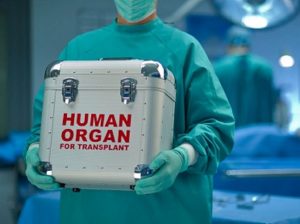The Volokh Conspiracy
Mostly law professors | Sometimes contrarian | Often libertarian | Always independent
An Orthodox Rabbi Makes the Case for Legalizing Organ Markets
Some of the points made by Rabbi Yitzhak Grossman in the course of assessing the issue under Jewish law have broader significance, as well.

In a series of two recent pieces published by the Bais Havaad Halacha center, Orthodox Rabbi Yitzhak Grossman, an expert on Jewish commercial law, makes the case for legalizing organ markets. In the first article, he defends organ markets against claims that they violate Jewish religious prohibitions against "charging for the performance of a mitzvah" (a good deed). In the second, he defends them against various public policy objections, most notably that they would lead to exploitation of the poor. Ultimately, the rabbi concludes that "the halachic consensus aligns more closely with the laissez-faire, libertarian stance of allowing payment for organs espoused by Professor Somin than with the current secular legal and ethical consensus that opposes such payment" (he cites here, one of my pieces on organ markets).
I am no expert on Jewish law, and therefore can't say much about that aspect of the matter. But it seems to me that many of the points on which Rabbi Grossman focuses are of interest to more secular people concerned about this issue, as well. It's also significant that he and I reach similar conclusions based on similar reasoning, despite having very different starting points (I am a secularist and an atheist). I think the value of preserving life can potentially be the basis for further common ground on organ markets between the religious and the secular.
The issue of paying for a mitzvah has a clear secular counterpart: fears that legalizing organ markets will somehow deter or devalue altruistic donations. This kind of argument was most famously made by Richard Titmuss in a well-known book attacking payment for blood donations on the grounds that it would "crowd out" free donations. Rabbi Grossman correctly points out that if this kind of reasoning is applied consistently, it would bar paying physicians for their services. After all, they too are doing a mitzvah, and they too could potentially provide services for free instead (or at least only charge enough to recoup costs).
More generally, the Titmuss theory is refuted by studies showing that payment for blood donations does not in fact reduce supply, and may well increase it. When it comes to blood plasma, supply is much greater in countries where payment is permitted than those where it is banned. In the area of organ supply, altruistic donation has not been enough to prevent a massive kidney shortage that leads to the deaths of some 40,000 people per year in the US alone, and consigns many thousands of others to years of suffering on kidney dialysis. Financial incentives are likely to increase organ donations more than blood and plasma donations, because the former is much more costly and uncomfortable for the donor. People are far more reluctant to make uncompensated gifts (especially to unknown strangers) when doing so is very costly.
In response to concerns about the exploitation of the poor, Rabbi Grossman cites religious law indicating that it is often permissible to pay workers to take risks on the job, and asks "Why should offering a poor person payment for his kidney be any more exploitative than offering him a dangerous job in exchange for a paycheck?" I have made similar points in various pieces myself, one of which Grossman quotes. As he notes, I also make a number of additional points against the exploitation argument.
I end on another point that I hope might be common ground between the religious and secular. It seems to me that among the central values of Judaism and other major world religions, are the preservation of life and the alleviation of needless suffering. Legalizing organ markets can achieve these goals on a truly massive scale. To put it in more religious terms, legalizing transactions that can save tens of thousands of lives is itself a huge "mitvzah."
Any argument against legalization must be compelling enough to outweigh this enormous good. If you want to ban life-saving transactions, you have to have an incredibly good reason - one that cannot be addressed by regulations that fall short of a ban. That seems true from the standpoint of any plausible moral theory, whether religious or secular.
Existing justifications for banning organ sales don't even come close to meeting such a heavy burden of proof. In previous writings, I have critiqued many of those arguments, such as concerns that it would be too dangerous for organ donors, claims that it amounts to to immoral "commodification" of the body, and fears that it would lead to exploitation of the poor (see also here). Even if some of these objections have more validity than I give them credit for, I hope secular and religious observers alike can agree they have to meet a very high standard to justify restrictions that literally kill tens of thousands of people every year.
UPDATE: I have made a few additions to this post.


Show Comments (49)